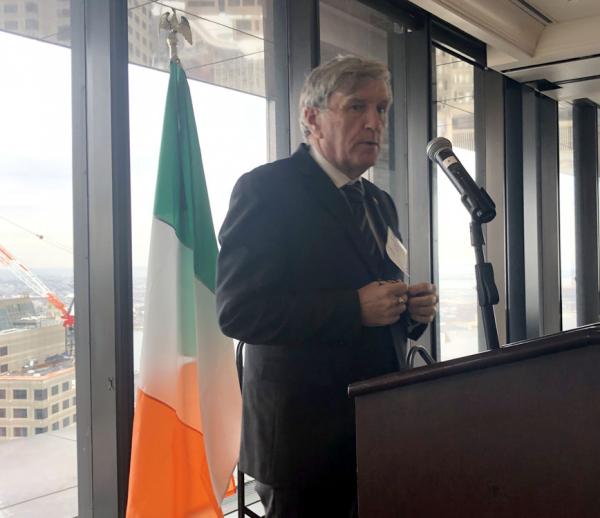February 25, 2020

Ambassador Daniel Mulhall, Ireland’s top diplomat in the United States, told an audience of Irish-American leaders gathered in Boston on Tuesday (Feb. 25) that recent “noise” about the United Kingdom possibly seeking to walk away from or amend its withdrawal agreement with the European Union “spells trouble for everyone,” particularly if London were to renege on its pledge for “no border” between the Republic and the North.
Mulhall’s remarks came at a luncheon hosted by the Sullivan & Worcester law firm and the Consulate General of Ireland at the Boston College Club in downtown Boston. The subject of his 30-minute talk was billed as “A Conversation on Brexit,” but the veteran statesman covered a range of topics, including uncertainty about who will represent Ireland at the traditional St. Patrick’s Day visit to the White House.
“It’s taking place. There will be a Taoiseach. But I have no idea who he or she will be,” Mulhall said. “So, I had to issue invitations yesterday, which said in honor of ‘An Taoiseach.’ No name. We have to wait and see.”
Mulhall, a Co. Waterford native who has been Ireland’s envoy to the US since 2017, is a seasoned diplomat who was formerly Dublin’s top emissary to London and Berlin. He was a part of the Irish government’s delegation that helped negotiate the 1998 Good Friday Agreement.
On Tuesday, Mulhall said the border was a key issue that he raised in counseling Britain against Brexit in the run-up to the 2016 referendum.
“I did my best to persuade people that it wasn’t a good idea, but I failed,” he said. “I tried to focus attention on the implications for Ireland, for the peace process, for British Irish relations, and for the border in Ireland. But that issue never got any attention during the referendum. Most people said, ‘That's fine, nothing will change in Ireland, don't worry.’”
Mulhall told his audience that we are now at “halftime” in the British-EU “divorce” process. He thinks that the British government should exercise its right to “look for an extension” beyond the deadline set for the end of this year for a trade agreement with the EU. Trade agreements of this sort, he says, typically take years to craft and ratify.
But weekend press reports indicating that the British government might seek to backtrack on its commitment to a “no border” agreement animated Mulhall’s remarks on Monday.
“I thought this issue had been resolved,” he said. “If I'd been speaking here two weeks ago, I would have been saying the border in Ireland got sorted. But now we see evidence of the British government resigning from its commitments under the withdrawal agreement and that spells trouble.
“Now this may be a bit shouting at halftime between the two sides, you know… and if that’s it, it’s fine,” he said. “But if it leads to a genuine push on the part of the British government to walk away from commitments it made last October, that spells trouble for everyone, including for Ireland.
“So we will stand firm, and I think on the basis of experience to date, we will have the solidarity of our European neighbors, which has been very impressive. And I think it has really made a big difference to Irish people and their attitude towards the EU has actually strengthened and become more positive.”
Later, in a question-and-answer session, Mulhall said that he doubted that the British government would actually abandon the withdrawal agreement in the face of domestic political pressure from British business interests.
“The EU has made it quite clear that if the UK turns its back on the withdrawal agreement, there will be no agreement about a future relationship. And I find it hard to believe that British industry and British business would allow the British government to jeopardize an agreement with the EU, which is vital for their national interests,” he said.
But, the border issue aside, could there be an upside to Brexit from the Irish perspective? Mulhall was unequivocal in his assessment that “there is no version of Brexit that is not detrimental to Ireland."
“We lose out for sure. And the sad thing is the losses will mainly be in rural Ireland,” he said, “because it's the food sector that will be damaged most…. They will diversify, but it will be difficult for them to diversify fully.”
One area in which Ireland will likely benefit, Mulhall said, will be increased growth in direct American business investment, which is already a huge part of Ireland’s economic growth. Over 750 American companies have a presence in Ireland. That number is likely to accelerate thanks to Brexit.
“Companies look at the UK and say, you know, they're less attractive now because they don’t guarantee direct access to the European single market,” he said. “Ninety companies have moved to Ireland already because of Brexit.”
That’s 5,000 new jobs in Ireland, he said, not a small number in a nation of 5 million, which is already enjoying near “full employment, with an unemployment rate around 4.5 percent.
“We've had the fastest growing economy in Europe for the last five years,” the ambassador said. “The prognosis for the future is highly positive.”
Mulhall also noted that the Irish people have embraced the fact that the global economy and their membership in the EU – which Ireland joined in 1974 – has been a major success.
“And the good news is that in our recent election, we had a number of candidates who stood on an anti-immigration platform. You know, send them all back and pull up the drawbridge. And none of them got any more than 2 percent of the vote. So, people in Ireland are comfortable with the idea of our being a global country, open to the world, exporting all over the world, importing ideas, technologies, and people. So that's a very positive kind of situation that we find ourselves in.”
Bill Forry is editor-in-chief of Boston Irish.com.

